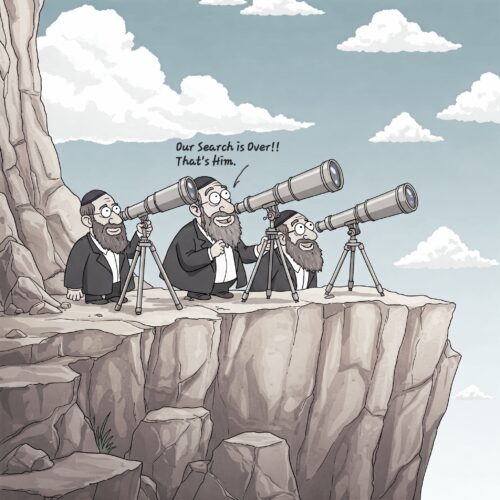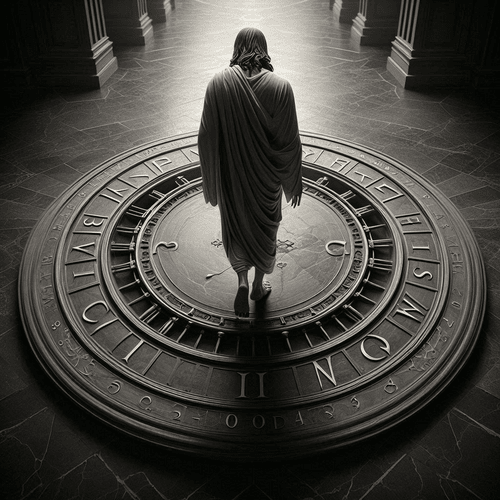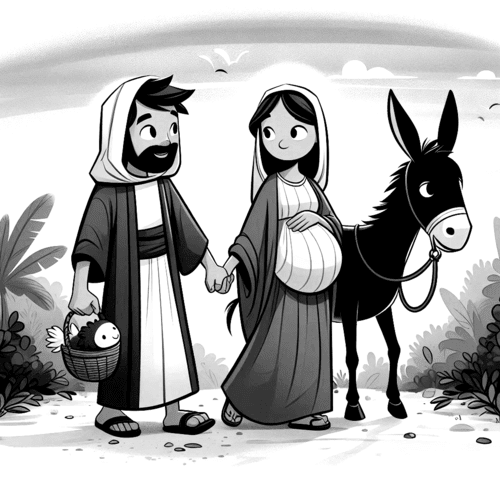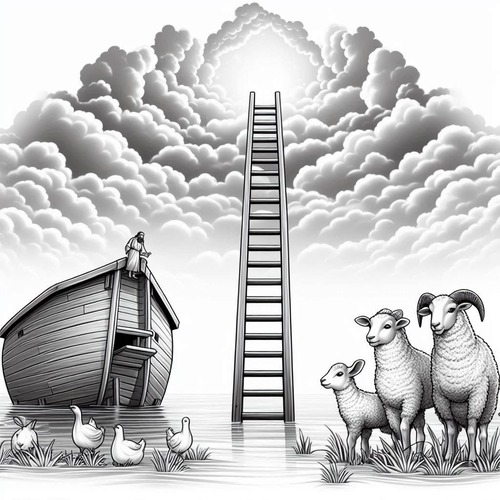A Prophet Like Moses: How Jesus Fulfilled the Deuteronomy 18 Test
“The LORD your God will raise up for you a prophet like me from among you, from your brothers—it is to him you shall listen.” (Deuteronomy 18:15)
These words, spoken by Moses to Israel, established one of the most significant messianic expectations in Jewish history. For centuries, God’s people awaited this promised prophet who would speak with divine authority and lead them as Moses had done. But who would this prophet be? And how would they recognize him?
UNDERSTANDING THE DEUTERONOMY 18 PROPHECY
To appreciate the full significance of Moses’ prophecy, we need to understand its context. As Israel prepared to enter the Promised Land, Moses knew his own ministry was ending. In Deuteronomy 18:15-19, he reassured the people God would not leave them without guidance:
“The LORD your God will raise up for you a prophet like me from among you, from your brothers—it is to him you shall listen… I will put my words in his mouth, and he shall speak to them all that I command him. And whoever will not listen to my words that he shall speak in my name, I myself will require it of him.” (Deuteronomy 18:15, 18-19)
This prophecy established specific criteria for the coming prophet:
- He would arise from among the Israelites
- He would be “like Moses” in role and authority
- He would speak God’s words with divine authority
- Obedience to him would be mandatory
When we examine Moses’ unique position in Israel’s history, we gain deeper insight into what “a prophet like Moses” truly means. Moses was:
- A mediator between God and the people
- A deliverer who freed Israel from bondage
- The one through whom God established His covenant
- A lawgiver who received and taught God’s commands
- A miracle worker who demonstrated God’s power
- One who knew God face-to-face
No ordinary prophet could fulfil this description. Throughout Israel’s history, prophets arose who partially reflected Moses’ role, but none could claim the full mantle—until Jesus Christ.
JESUS: A PROPHET LIKE MOSES
When we examine Jesus’ life and ministry through the lens of Deuteronomy 18, the evidence is overwhelming. Consider how Jesus fulfilled each criterion:
- Arising from among the Israelites: Jesus was born as a Jew from the tribe of Judah, raised in a Jewish household, and thoroughly immersed in Jewish culture and tradition. Matthew and Luke both carefully document His lineage to establish His credentials as a true Israelite. As Hebrews 7:14 affirms, “it is evident that our Lord was descended from Judah.”
- Mediator between God and the people: Moses stood between God and Israel at Sinai when the people were afraid to hear God’s voice directly (Deuteronomy 5:23-27). Similarly, Jesus became the perfect mediator between God and humanity. Paul declares, “There is one mediator between God and men, the man Christ Jesus” (1 Timothy 2:5). But while Moses mediated an earthly covenant, Jesus mediates “a better covenant, which has been enacted through better promises” (Hebrews 8:6).
- Deliverer from bondage: Moses led Israel out of physical slavery in Egypt. Jesus delivers people from the deeper bondage of sin and death. As He proclaimed, “If the Son sets you free, you will be free indeed” (John 8:36). The Exodus under Moses foreshadowed the greater exodus accomplished through Christ’s death and resurrection.
- Covenant establisher: At Sinai, Moses mediated the covenant between God and Israel. Jesus established the New Covenant through His blood: “This cup that is poured out for you is the new covenant in my blood” (Luke 22:20). While Moses sprinkled blood on the people to seal the Sinai covenant (Exodus 24:8), Jesus gave His own blood as the covenant sacrifice.
- Divine lawgiver: Moses received and taught God’s law at Sinai. Jesus, in His Sermon on the Mount, demonstrated His divine authority to interpret and even expand Moses’ law. Six times He declared, “You have heard it was said… but I say to you,” exhibiting an authority that astonished His hearers (Matthew 7:28-29). Unlike other prophets who prefaced their messages with “Thus says the LORD,” Jesus spoke with direct authority: “I say to you.”
- Miracle worker: Moses performed great signs and wonders demonstrating God’s power in Egypt and the wilderness. Jesus’ miracles not only paralleled those of Moses but often surpassed them in scope and nature. He turned water into blood; Jesus turned water into wine; Moses provided manna in the wilderness, while Jesus multiplied loaves and called Himself the Bread of Life; Moses parted the Red Sea while Jesus calmed storms and walked on water; Moses brought healing through the bronze serpent, while Jesus healed directly by His word and touch.
- Intimate knowledge of God: Deuteronomy 34:10 states, “There has not arisen a prophet since in Israel like Moses, whom the LORD knew face to face.” Yet Jesus claimed an even closer relationship with God: “No one knows the Father except the Son” (Matthew 11:27). While Moses was permitted to see God’s back (Exodus 33:23), Jesus declared, “Whoever has seen me has seen the Father” (John 14:9).
THE TRANSFIGURATION: DIVINE ENDORSEMENT
Perhaps the most striking validation of Jesus as the prophet greater than Moses came at the Transfiguration. There, on the mountain, Jesus was joined by Moses and Elijah—representing the Law and the Prophets. As Peter, James, and John watched in awe, “a bright cloud overshadowed them, and a voice from the cloud said, ‘This is my beloved Son, with whom I am well pleased; listen to him’” (Matthew 17:5).
This divine declaration directly echoes the language of Deuteronomy 18:15—“it is to him you shall listen.” In this remarkable scene, Moses himself was present as God transferred ultimate authority to Jesus. The presence of Moses alongside Jesus was not coincidental; it was a divine handover ceremony, with God Himself declaring Jesus’ superiority.
When the cloud lifted, the disciples “saw no one but Jesus only” (Matthew 17:8)—a powerful visual symbol that Jesus now stood alone as God’s authoritative spokesman. Moses and Elijah had vanished, their ministries finding their fulfilment in Christ.
JESUS: GREATER THAN MOSES
While Jesus fulfilled all the criteria of being “a prophet like Moses,” the New Testament consistently portrays Him as far surpassing Moses:
- Superior glory: Moses’ face temporarily reflected God’s glory after being in His presence (Exodus 34:29-35). Jesus, however, is the very “radiance of the glory of God” (Hebrews 1:3). At the Transfiguration, it was Jesus Himself who shone with divine glory; His face “shone like the sun, and his clothes became white as light” (Matthew 17:2).
- Greater authority: Moses was a faithful servant in God’s house. Jesus is the Son over God’s house, as Hebrews 3:3-6 explains: “Jesus has been counted worthy of more glory than Moses—as much more glory as the builder of a house has more honour than the house itself… Moses was faithful in all God’s house as a servant, to testify to the things that were to be spoken later, but Christ is faithful over God’s house as a son.”
- Perfect sacrifice: Moses offered animal sacrifices that could never fully atone for sin. Jesus offered Himself as the perfect, once-for-all sacrifice. “He has appeared once for all at the end of the ages to put away sin by the sacrifice of himself” (Hebrews 9:26).
- Eternal priesthood: Moses consecrated Aaron and his descendants as priests, but their ministry was temporary. Jesus serves as our eternal high priest “after the order of Melchizedek” (Hebrews 7:17). His priesthood never ends, and through it, He “is able to save to the uttermost those who draw near to God through him” (Hebrews 7:25).
- Resurrection power: Moses died and was buried before reaching the Promised Land (Deuteronomy 34:5-6). Jesus conquered death through His resurrection and opened the way to the true Promised Land—eternal life with God. “I am the resurrection and the life,” He declared. “Whoever believes in me, though he die, yet shall he live” (John 11:25).
WHY THIS MATTERS
Understanding Jesus as the prophet like Moses—and greater than Moses—transforms how we approach Scripture and our faith:
- It affirms the unity of God’s redemptive plan. The same God who spoke through Moses spoke definitively through Jesus. The Old and New Testaments tell one cohesive story.
- It establishes Jesus’ supreme authority. When Jesus speaks, it is God speaking. His words demand not just our attention but our obedience.
- It highlights the superiority of the New Covenant. While we honour the Mosaic covenant as God’s word, we recognise that in Christ we have received “a better covenant” built on “better promises” (Hebrews 8:6).
- It calls us to decisive response. Deuteronomy 18:19 warned that God Himself would hold accountable anyone who rejected this prophet’s words. Jesus echoed this warning: “The one who rejects me and does not receive my words has a judge; the word that I have spoken will judge him on the last day” (John 12:48).
CONCLUSION: A PROPHET LIKE MOSES
When Moses prophesied about a coming prophet like himself, he was pointing to someone far greater than he could imagine. Jesus didn’t merely pass the Deuteronomy 18 test—He redefined it. He fulfilled every criterion of Moses’ prophecy while simultaneously transcending them all.
The Transfiguration scene captures this truth perfectly: Moses and Jesus stand together on the mountain, but only Jesus shines with divine glory. Moses, the greatest prophet of the Old Covenant, appears alongside Jesus only to have God declare, “Listen to Him.” And when the vision ends, Moses has disappeared, and the disciples see “Jesus only.”
“Long ago, at many times and in many ways, God spoke to our fathers by the prophets, but in these last days he has spoken to us by his Son” (Hebrews 1:1-2).
A PROPHET LIKE MOSES: RELATED FAQs
Did other Jewish messianic figures claim to be a prophet like Moses mentioned in Deuteronomy 18? Several first-century Jewish leaders did claim or were proclaimed to be prophet-like figures in Moses’ tradition. Notable examples include Theudas, who promised to part the Jordan River, and “The Egyptian,” who gathered followers at the Mount of Olives. Unlike Jesus, these figures failed to demonstrate the full range of qualities described in Deuteronomy 18, and their movements quickly collapsed.
- How do contemporary Reformed scholars interpret the “prophet like Moses” passage today? Contemporary Reformed scholars like DA Carson and Kevin Vanhoozer emphasise the typological relationship between Moses and Jesus, seeing the prophecy as both predictive and pattern-setting. Michael Horton points to the passage as a key element in understanding Christ’s threefold office (prophet, priest, king), with the prophetic office establishing Jesus’ authority to interpret and fulfil the law. GK Beale’s work on biblical theology underscores how Jesus recapitulates and perfects Moses’ mediatorial role.
- How does Acts 3:22-23 help us understand the early church’s view of Jesus as the prophet like Moses? In Acts 3:22-23, Peter explicitly applies Deuteronomy 18:15-19 to Jesus in his sermon at Solomon’s Portico. This demonstrates that the earliest Christians, including the apostles, understood Jesus as the definitive fulfilment of Moses’ prophecy. Peter’s application shows this wasn’t a later theological development but part of the apostolic proclamation from the beginning.
What did John Calvin specifically say about Jesus as the prophet like Moses? Calvin emphasised Moses’ prophecy pointed to Christ as the “head of the prophets” who would bring perfect doctrine. In his commentary on Deuteronomy, Calvin wrote Moses was establishing that Christ would be “the final messenger of God,” with all other prophets serving merely as “heralds of preparation.” Calvin saw this as central to understanding Christ’s prophetic office, through which believers receive perfect instruction.
- How does the concept of Jesus as the prophet like Moses affect our understanding of biblical authority? Jesus’ fulfilment of the Deuteronomy 18 prophecy establishes Him as God’s ultimate spokesman, giving His words supreme authority. Reformed theologian Tim Keller notes this means Christians should approach Scripture as Christocentric, with Jesus’ teaching providing the interpretive key for all biblical texts. Since Jesus affirmed the authority of the Old Testament while claiming authority to interpret and fulfil it, we see both continuity and development in biblical revelation.
- How does understanding Jesus as the prophet like Moses impact interfaith dialogue with Judaism? Recognising Jesus as the fulfilment of Deuteronomy 18 provides common ground for respectful dialogue with Jewish communities. Contemporary Reformed scholar Michael Bird suggests this prophecy offers a bridge for discussion about messianic expectations in both traditions. While Christians and Jews differ on Jesus’ identity, exploring how Deuteronomy 18 shaped both faiths’ understandings of prophetic authority can foster meaningful theological exchange.
How does Jesus’ fulfilment of Deuteronomy 18 connect to His teaching about the “new exodus” theme? Jesus frequently framed His ministry in exodus motifs, suggesting He understood His role as the prophet like Moses leading a new exodus. NT Wright and Richard Gaffin have shown how Jesus’ transfiguration conversation with Moses about His upcoming “departure” (literally “exodus” in Greek, Luke 9:31) reveals Jesus’ consciousness of fulfilling this prophecy. This new exodus theme culminates in Jesus’ resurrection, which accomplishes a greater deliverance than the exodus from Egypt.
A PROPHET LIKE MOSES: OUR RELATED POSTS
- Who Is Isaiah 53’s Suffering Servant: The Messiah or Israel?
- How the Torah Points to Christ: Prophecies, Patterns, Promises…
- The Tabernacle: How Does It Point to Christ’s Incarnation?
- Types of Christ and His Cross in the Old Testament
- Jesus in the Old Testament: Glimpses of the Coming Saviour
- Jesus in the Jewish Festivals: From Shadow to Substance
Editor's Pick

Should We Stop Using Male Pronouns for God? Why Do We Say No?
A friend of ours arrived eagerly at his first theology class in seminary. But he quickly discovered something troubling: the [...]

Did Old Testament Law Force Women to Marry their Rapists?
**Editor’s Note: This post is part of our series, ‘Satan’s Lies: Common Deceptions in the Church Today’… Viral misinformation abounds [...]

From Danvers To Nashville: Two Statements, One Biblical Vision
30 years separate the Danvers Statement on Biblical Manhood and Womanhood (1987) and the Nashville Statement on Human Sexuality (2017). [...]

The Nashville Statement: Why Affirm It Despite Media Backlash?
WHY DO REFORMED CHRISTIANS STAND BY THIS STATEMENT ON MARRIAGE AND GENDER? When the Nashville Statement was released in 2017, [...]

Who Is Belial? Solving The 2 Corinthians 6:15 Mystery
Belial: This name from the pages of Scripture chills the soul. Who is this mysterious figure Paul invokes in 2 [...]

Celibacy Or Castration: What Jesus Really Means in Matthew 19:12
One of Scripture's most shocking misinterpretations led theologian Origen to castrate himself in the third century. His tragic mistake? Taking [...]

Philippians 4:13: Did Paul Really Mean We Can Do ALL Things?
"I can do all things through Christ who strengthens me." It's on gym walls, graduation cards, and motivational posters everywhere. [...]

The Ordinary Means of Grace: Why Are They Indispensable?
ORDINARY MEANS FOR EXTRAORDINARY TRANSFORMATION What if God's most powerful work in believers' lives happens through the most ordinary activities? [...]

Is the Bible God’s Word? Or Does It Only Contain God’s Word?
The authority of Scripture stands at the crossroads of modern Christianity. While some argue the Bible merely contains God’s Word [...]

Will We Remember This Life in Heaven? What Isaiah 65:17 Means
"Will I remember my spouse in heaven? My children? Will the joy we shared on earth matter in eternity?" These [...]
SUPPORT US:
Feel the Holy Spirit's gentle nudge to partner with us?
Donate Online:
Account Name: TRUTHS TO DIE FOR FOUNDATION
Account Number: 10243565459
Bank IFSC: IDFB0043391
Bank Name: IDFC FIRST BANK






